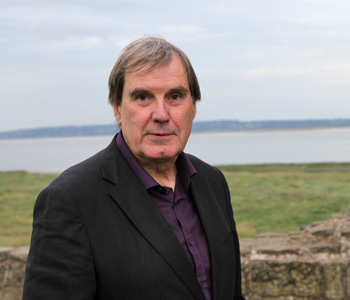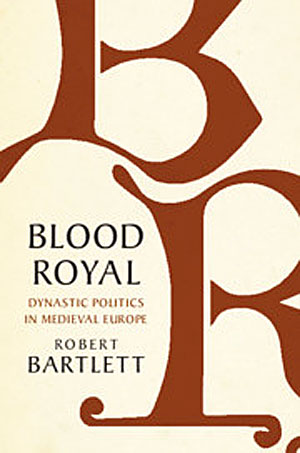
Most countries in medieval Europe were monarchies, ruled by a royal or imperial family, a dynasty, so politics at the top level was shaped by the births, marriages, and deaths of the members of that family, and by competition and cooperation within the dynasty. This is no surprise to anyone who knows a little bit about the history of the period and any account of a medieval reign will discuss such things. However, I had never come across a book that analyzed this fundamental feature of the medieval world in a systematic and thematic way, although there are such studies for other periods, notably Jeroen Duindam, Dynasties: A Global History of Power, 1300-1800 (Cambridge University Press, 2016). A distinctive feature of the book is its wide scope, since it covers the whole medieval period (500-1500) and deals with most of Europe, namely Latin Christendom and the Byzantine empire. By the year 1100 Latin Christendom, that part of the world recognizing the authority of the pope, covered western, northern, and central Europe (I exclude the East Slavs because of my own linguistic limitations).
The dynasty was not only a biological unit but also a political or ideological one. Family structures varied across time and place, most notably between systems such as that of the Merovingian kings of the Franks (c. 500-751) or the Irish royal dynasties, where kings had many sexual partners and all the children were eligible for rule, and the system that, with the backing of the Church, came to predominate in most parts of Europe, where kings were expected to have one wife at a time, could dissolve the marriage only in very specific circumstances and a sharper line was drawn between legitimate and illegitimate children. Succession practices were very different in the two systems and the former tended to produce high levels of competition and violence within the dynasty but meant that dynasties rarely died out biologically, the latter having less intra-dynastic violence but being more vulnerable to biological extinction.
My book concentrates on the second, predominant system, and does so in two ways, which give the book its two-part structure. In part one, “The Life Cycle,” I investigate the whole process of family reproduction, starting with “Choosing a Bride”, then pursuing such themes as “Waiting for Sons to be Born” and “Waiting for Fathers to Die”, ending, naturally enough, with “Royal Mortality”: life expectancy, the frequency of violent death, choice of burial place and forms of commemoration. Part two is titled “A Sense of Dynasty” and discusses ways that ruling families expressed their identity, through such visual cues as heraldry, newly invented in the twelfth century, choice of personal names, or the graphic family tree, and how they shored themselves up in this unstable political world through the supposed guidance of astrology and prophecy.
I think the material in the book has relevance to issues beyond medieval Europe. For instance, anyone interested in family structures and family strategies could find useful comparative material here. It is quite clear that what constitutes “a family” has varied from period to period and from place to place. Such changes are visible over the medieval period itself. I have a discussion of adoption, for example, which was a common practice in the Roman Empire but relatively rare in western Europe in the Middle Ages. Rare but not unknown. This left me quite uncertain about what was going on, and I do not disguise that in the book. Again, the whole book explores what were the boundaries between the private and public. In a world where political power was transmitted through families, it is tempting to describe this as “public power in private hands”, especially when compared to the modern western world, where a sharp line is drawn—the President of the United States or a European Prime Minister can legitimately transmit property but not office to their children. In the medieval period boundaries were different. And another general theme of the book is the uncertainties of history, as illustrated by the many counterfactuals that crop up in the dynastic world: Castile and France could have become one country; there might have been a large kingdom called Burgundy between France and Germany; all the Scandinavian countries might have been one permanently, as they were temporarily. Given the rise of nationalism in recent decades, it is important to note that countries come and go.
The path to this book was a long one. I started teaching medieval history in the 1970s and over the years covered a large number of topics, some of which resulted in books (on trial by ordeal, medieval colonialism, Norman and Angevin England, and the cult of the saints, among others), but the dynastic nature of political power was something that cropped up again and again, and, of course, needed to be explained to students (as well as to myself). And among the historical documentaries I have written and presented for British television is a three-part series called “The Plantagenets” and this naturally involved thinking about what a dynasty was, and what were the dynamics of such a political system. So, when I received an invitation from Trinity College Dublin to give a series of lectures on a medieval topic of my choice, “dynasties’ came to mind. And I always accept invitations from Trinity College Dublin.
A “just browsing” feminist could turn to the chapter on female sovereigns to find out about how some countries, at some times, were ruled by women. I counted 27 examples. Or they could turn to the chapter called “Choosing a Bride” to see the way high-born females were inspected, traded and, if necessary, discarded. There is no doubt that medieval Europe was a patriarchal society.
A “just browsing” nerd might want to start with the section on the numbering of monarchs, the most nerdish thing I have ever written. We usually take this practice for granted—Henry VIII, Louis XIV, Napoleon III, and so forth—but the custom had to start somewhere and decisions had to be made about which number to apply. In 1198 there was a German king numbered Phillip II. He was “the second” because the German king also claimed the right to become Holy Roman Emperor and there had been a Roman emperor called Phillip in 244-9, almost a thousand years earlier. So that “second” was a political assertion of continuity: that the Roman empire was not dead. In 1330 the English king Edward adopted the style “the third since the conquest”, meaning the Norman Conquest of 1066. Kings of England called Edward before 1066 (there were several) thus did not count—literally. English history restarted in 1066. So that is a view of national history encapsulated in the numbering of a monarch.
A dutiful “just browsing” reader could start at the beginning, since that is where I set out what the book is about and how I intend to organize it, but the chapters can be read independently. And, of course, since part one is called “The Life Cycle”, and a cycle can be entered at any point, a reader fascinated by mistresses, wicked uncles, or death could go straight to the relevant section. I must confess that I do not always read a book from cover to cover, and this is one reason I take extra care over the index, since that will be the key to the book for many readers. Mine runs from “Aachen, Rhineland” to “Zoe Zaoutzaina (d. 899), wife of Leo VI”.
If I were asked “why read about the Middle Ages?”, I think I would give three reasons. First, that we can see there the roots of some things that are important in the modern world: representative government, universities, corporate towns, reading glasses, clocks, for example. To look for origins is a natural impulse. Second, that we there encounter a world quite different from our own, sometimes dramatically so. In trial by ordeal, an accused person might be required to carry a red-hot iron three paces, then have their hand bound and inspected after three days. If it was healing cleanly, the accused was innocent, if not, not. This is not a current practice but in the early Middle Ages it was and demands some kind of explanation—both of why it was and why it is no longer. To try to understand societies different from our own is a basic form of human inquiry. The social science of anthropology was born from that impulse, but it applies equally well as a description of the historian’s task. The third reason for reading about the Middle Ages is that it is a period full of wonderful stories and fascinating people.
I would hope that Blood Royal would be of interest under all these three headings. It does explain features of modern Europe, such as why France and Germany are separate countries and why Spain and Portugal are separate countries. In both cases the explanation lies in family disputes: between brothers in the ninth century, between sisters in the twelfth. And the whole book is premised on the idea that the dynastic system is alien to modern western democracies and needs to be explained to audiences in those countries. In the few surviving European monarchies, the royal family is sometimes a subject of interest or gossip, but in the dynastic world it was central to the whole political system. And, of course, I do think the book is full of stories and characters of intrinsic interest.
Before doing research for the book, I had never come across the document issued by Petronilla, queen of Aragon, in 1152. It begins, “I, Petronilla, queen of Aragon, lying and labouring in childbirth at Barcelona…”, and then makes provision for the child that was imminently expected, whether it is a boy that “is to proceed from my womb, by God’s will”, or “if a daughter should proceed from my womb”, and giving 2,000 gold coins to the churches of Aragon and Barcelona to pray for her. She gave birth to a healthy boy who become king after her, and “the royal seed” of Aragon was thus preserved. She was fifteen years old. It demonstrates very well the way that the political system of medieval Europe was founded on the female body. “Dynasty—where kinship and politics meet”, as the kind author of one of the blurbs on the book jacket puts it.


Robert Bartlett is Bishop Wardlaw Professor of Mediaeval History Emeritus at the University of St Andrews in Scotland, a CBE, and a Fellow of the British Academy. He grew up in South London, received his university education at Cambridge, Oxford, and Princeton, taught earlier at the universities of Edinburgh and Chicago, and has held fellowships in America, Germany, and Israel. His books include The Making of Europe: Conquest, Colonization and Cultural Change 950-1350, which won the Wolfson Literary Prize for History, as well as Blood Royal: Dynastic Politics in Medieval Europe, which is featured in his recent Rorotoko interview.